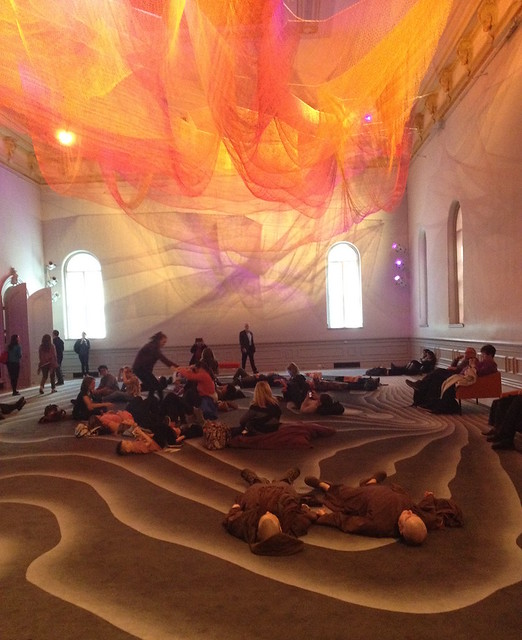FEATURES|COLUMNS|Mindful Living (inactive)
Wonder: The Heart of Renunciation
 Photo by the author
Photo by the authorI recently had a chance to visit the Wonder* art exhibition at the Renwick Gallery in Washington, DC, which comprises two floors filled with large-scale, site-specific installations. The exhibits include a room of woven willow-branch huts that one can walk through, rainbow-colored threads stretched floor-to-ceiling to form a giant prism refraction, and an entire room in which one can lie on the floor and watch the shifting colors of a giant net that appears to float in the air. The exhibition is aptly titled, as each piece helps the viewer to look at the world with fresh eyes, awakening a deep inner joy. Leaving the gallery, I felt grateful for the opportunity to enjoy the art, yet a little amused—for all the effort that had clearly gone into creating these beautiful works, I know that practicing mindfulness is a much easier way to find wonder.
Applying mindfulness in daily life has been proven to offer numerous benefits for one’s physical and mental health,** although the practices taught by the Buddha are much more than a self-help program. Rather than building a new skill that exists outside of oneself, Buddhist mindfulness practice is a process of stripping away distractions to reveal a natural state of awareness, in which one is calm and content. And by becoming increasingly present to life as it is, moments of wonder somehow crop up on their own.
The Wonder exhibition left me thinking about the third of the ten paramis***—nekkhamma, or renunciation. This is not a very popular virtue in the modern world; we can learn more, buy more, and do more than at any other era in history, so why would anyone want less of anything? Indeed, from the outside, renunciation may seem like repression, in which there is no sense of wonder. But renunciation is an important quality to cultivate in a world of endless choice. As our lives and minds become more cluttered, we find ourselves less capable of appreciating the simple wonders of daily life. Sitting quietly to enjoy a sunset is a very different experience from taking a “selfie” during that same sunset and then posting it on Facebook.
So, what is renunciation? It is the practice of understanding true peace, understanding what blocks true peace, and choosing to let go of the things that get in the way. Looked at in reverse, renunciation is a practice of compassion because it requires one to understand suffering and how to relieve it. It is not about following ascetic rules imposed by an authority figure or trying to appear virtuous. Going deeply into renunciation is a journey into fearlessness, for it is fear that keeps one attached to the habits and things that block true peace. There is so much space to be found when we cut out the distractions that we want to forgo. There is an entire movement of people, for example, who practice a “technology sabbath”**** by spending one day a week away from computers, smartphones, and TV in order to better appreciate time spent with family and friends or simply in one’s own company. This is a very practical way to bring the virtue of renunciation into daily life.
When I first considered taking the Five Precepts as a life path, I was unsure whether I could give up alcohol. I drank very rarely and so didn’t see a need to stop drinking completely. I decided to examine why I chose to drink, and quickly saw that I only drank in social situations in which I felt uncomfortable. I was unhappy with this reason, so I decided to try not drinking for a year. At first I worried how others would react, so I accepted drinks and pretended to take a sip before pouring them down the sink when no one was looking, but I soon found I was much happier to simply say “No, thank you.” There was always someone around who was in recovery, or pregnant, or a designated driver, and I felt happy to “normalize” the choice not to drink. I also became increasingly aware of the pain alcoholism had created in my family and in the world. From that point, each time I chose not to drink I felt stronger and happier, knowing that I was contributing in a small way to a collective healing from alcoholism.
But what about the things that we know we should give up but just can’t? Everyone is prone to some type of addiction, be it alcohol, sugar, coffee, gambling, complaining, sex, work, being right, or seeking approval. Addiction is basically a habitual attempt to relieve pain that brings only temporary relief. To transform an addiction, the underlying pain needs to be understood, otherwise any attempt to change turns into repression. Telling oneself to quit is very different from realizing that one wants to. Looking deeply into our lived experience by being willing, or forced, to feel the fullness of the suffering, alone can bring about an embodied wisdom. Renunciation is not the first step in addiction recovery, though it is often the goal.
A key aspect in cultivating the virtue of renunciation is knowing how to tell the difference between renunciation and repression. If we start by looking at the body, we see that renunciation brings ease and lightness while repression brings tension and heaviness. And if we look at the mind, renunciation brings wonder and joy while repression brings worry and stress. Renunciation is also an ongoing process as one learns from lived experience, seeing where the hooks are and gently untangling reaction and habit from one's inner wisdom and highest intention. It is not always easy, but the rewards far outweigh the effort.
If you are not sure how to practice renunciation, you could start by thinking about the last time you said to yourself, “I wish I hadn’t done that!” What do you do repeatedly that you regret? It’s a good idea to make a list. If making this list brings up guilt or shame, breathe deeply and let those emotions move on. This is a practice of simply seeing oneself more fully—there is no need for judgement. When you see a pattern of small things that get in the way of true happiness, name them. You can even have a conversation with the pattern. “Hello complaining. I see that you always show up when I get to work. I think that I’ll feel better with you, but I always feel worse. Tomorrow, I’m going to stay silent when I get to the office.” Make a concrete and achievable plan based on your own experiences and motivations, and then be creative and experiment. What does it feel like to not complain? It might start off feeling uncomfortable, so try it a few times to know if there is truly a joyful release waiting for you when you refrain. And if you forget or “fail” the first 10 times and “succeed” on the 11th, celebrate! Maybe it will only take nine attempts to return to the new pattern the next time. Don’t start with the hardest habit—start small to build up your confidence. Don’t worry about the past. Put the energy of remorse into a growing determination to choose your actions in the future. Remember that understanding is more important than results. As long as you are learning, you are growing. As you pay attention to your life and release the actions that get in the way of happiness, it will be hard to hold back a sense of wonder. But don’t believe me—try it out yourself and see!
* http://renwick.americanart.si.edu/wonder/gallery/
** http://www.mindful.org/the-science-of-mindfulness/
***The ten paramis or perfections: generosity (dana), morality (sila), renunciation (nekkhamma), wisdom (panna), energy (viriya), patience (khanti), truthfulness (sacca), resolution (adhitthana), loving-kindness (metta), and equanimity (upekkha).
**** http://www.yesmagazine.org/happiness/time-for-a-tech-sabbath
See more
Inner Goodness: The Perfection of Morality (Buddhistdoor Global)
The Perfection of Giving (Buddhistdoor Global)
















